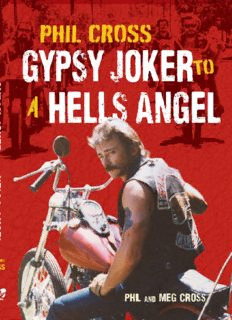
Phil Cross: Gypsy Joker to a Hells Angel PDF
Preview Phil Cross: Gypsy Joker to a Hells Angel
PHIL AND MEG CROSS PHOTO EDITED BY MARK SHUBIN CONTENTS INTRODUCTION CHAPTER 1 Coyote CHAPTER 2 Atypical Teen CHAPTER 3 See the World, Join the Navy CHAPTER 4 In Transition CHAPTER 5 The Rise of the San Jose Gypsy Jokers CHAPTER 6 The Fall of the San Jose Gypsy Jokers CHAPTER 7 Hells Angels CHAPTER 8 On the Run CHAPTER 9 Terminal Island Is Not a Vacation Spot CHAPTER 11 Meg CHAPTER 10 Back Home CHAPTER 12 On the Run, Again CHAPTER 13 Back Home, Again CHAPTER 14 Deerfield CHAPTER 15 Hells Angels Santa Cruz Epilogue Acknowledgments In Memoriam M y name is Phil Cross, and I’ve been a Hells Angel for forty-three years. Everybody has their own story as to what led them to become a member, but we all have one thing in common: a love of both motorcycles and the camaraderie of the brotherhood. This is my story. I have been a Hells Angel longer than many people predicted I would be alive. I’m not kidding; I was somewhat reckless in my youth and was told more than once or twice, or a dozen times, that I would not live to see thirty, or probably even twenty-one. You get the picture. Well, it turns out that they were all wrong … really wrong. I even survived a liver transplant when I was fifty- nine and stage four cancer five years later. So I guess you could say I have been lucky, or maybe I was just meant to live a long and interesting life (and that I have). And it all started when I was born in San Francisco, California. San Francisco has always been an interesting place, right from the start. Before it was called San Francisco, the Bay Area was home to the Ohlone Indian tribe to the north and the Miwok Indian tribe to the south, and you have to agree they were pretty interesting people. Then the missionaries came and built Mission San Francisco in the late 1700s. The next big deal was the gold rush that started in 1847, which made for big growth in two industries in San Francisco: prostitution and gambling—this was the Barbary Coast. In 1906, the big quake hit and the fire that followed wiped out the entire Barbary Coast, which meant no whores and no gambling … at least not for a while. San Francisco played a big role in World War I, but nothing like it did during World War II. Being a port city, San Francisco was vital in the war effort. The shipyards located there and along the coast worked with machine shops, metal fabricating shops, and woodworking shops to become one giant ship-building industry. That’s what my dad did for a living; he helped build those ships that were so badly needed by our armed forces, and that’s where I come in. Me as a twenty-five-year member. My mom as a sweet sixteen-year-old. I was born in San Francisco, California, on August 11, 1942. We were an average middle-class American family: Mom, Dad, my kid brother, the family dog Corky, and me. Unfortunately for my parents, we had to leave San Francisco. When I was two years old, I got sick and just couldn’t get seem to get better. The doctors found a spot on one of my lungs and told my folks that I needed to live in a warmer, dryer climate, so we packed up and headed for Coyote, California (to my grandmother’s ranch). My parents went from living in one of the most important and urban cities in the world, with a population of 635,000, to a place no one knew existed, with a population of about twenty-five farmers. It was probably difficult for my parents at first, but it was a good place for a rambunctious kid like me to grow up. I have wondered what my life would have been like if I had grown up urban rather than rural. Maybe I would have been a pharmacist! Before I jump into my growing up years in Coyote, here are some of the highlights of 1942 that I find interesting. Franklin D. Roosevelt was president of the United States, Angelo Joseph Rossi was mayor of San Francisco, the Hells Angels were a U.S. Army Air Force Bombardment Group, and we were right smack dab in the middle of World War II. So I guess it could be said that I came into a world at war, and I have spent most of my life fighting—either for something, or against something, but fighting nonetheless. Mom and Dad right after they were married. Dad and I on a visit to Grandma’s ranch when I was about six months old.
Description: